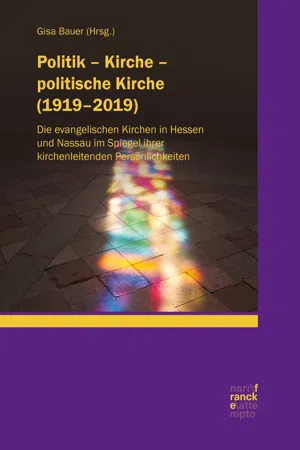
Politik – Kirche – politische Kirche (1919–2019)
Die evangelischen Kirchen in Hessen und Nassau im Spiegel ihrer kirchenleitenden Persönlichkeiten
- 301 pages
- English
- ePUB (mobile friendly)
- Available on iOS & Android
Politik – Kirche – politische Kirche (1919–2019)
Die evangelischen Kirchen in Hessen und Nassau im Spiegel ihrer kirchenleitenden Persönlichkeiten
About this book
Die Trennung von Staat und Kirche in der Weimarer Reichsverfassung 1919 eröffnete den deutschen evangelischen Landeskirchen erstmalig die Möglichkeit, sich eigenverantwortlich in der Gesellschaft und gegenüber der staatlichen Politik zu positionieren. Erste Umgestaltungen der Kirchen in Hessen und Nassau nach demokratischen Prinzipien kamen im Nationalsozialismus vorerst wieder zum Abbruch. Seit 1947 spielten viele der politischen und gesellschaftlichen Debatten in der EKHN eine große Rolle, z. B. die Diskussionen um die Wieder- und Atombewaffnung unter Kirchenpräsident Martin Niemöller, der Protest gegen den Bau der Startbahn West, der sowohl Helmut Hild als auch Helmut Spengler beschäftigte, oder die Frage nach dem Umgang mit dem Islam, der sich Peter Steinacker intensiv widmete. Anhand prägnanter Positionen kirchenleitender Persönlichkeiten zeigt der Band in sechs Beiträgen, wie die Politisierung der EKHN erfolgte und wie sie auf das Selbstverständnis innerhalb der EKHN zurückwirkte, eine der politischen Landeskirchen in Deutschland zu sein.
Frequently asked questions
- Essential is ideal for learners and professionals who enjoy exploring a wide range of subjects. Access the Essential Library with 800,000+ trusted titles and best-sellers across business, personal growth, and the humanities. Includes unlimited reading time and Standard Read Aloud voice.
- Complete: Perfect for advanced learners and researchers needing full, unrestricted access. Unlock 1.4M+ books across hundreds of subjects, including academic and specialized titles. The Complete Plan also includes advanced features like Premium Read Aloud and Research Assistant.
Please note we cannot support devices running on iOS 13 and Android 7 or earlier. Learn more about using the app.
Information
Table of contents
- Cover
- Titel
- Impressum
- Inhaltsverzeichnis
- Introduction
- CHAPTER 1 Ontologies and Metaphysics of Negativity
- CHAPTER 2 Negative Anthropologies
- CHAPTER 3 Negative Theology and Apophasis
- CHAPTER 4 Languages of Negativity
- CHAPTER 5 Phenomenology and Negativity
- CHAPTER 6 Structures of Negativity in Adorno
- CHAPTER 7 Negative Epistemic Procedures and Philosophy of Education
- Editors and contributors
- Fußnoten